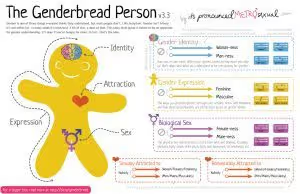
One of the most incredible parts of working as a nanny is the close relationship you develop with your nanny charges. As the world grows and our understanding of other humans evolves, our nanny kids learn about things and may come to us, their confidants, with complex questions and we want to be able to provide them with support.
Sometimes, the connection between you and your nanny kids is one of the most trusted sources of support, so preparing yourself for these complex conversations is essential. We know a wonderful nanny who worked with a sweet kiddo that approached them with questions about their identity. The child was being bullied by classmates and felt that they identified a certain way that wasn't particularly binary but didn't understand why other children were making fun of them for it, or why there were any negative associations with their identity at all.This compassionate nanny was able to sit down with their tender nanny kid and go over the mean comments from the other kids and gently explain why they were using inappropriate language and how to effectively navigate the school situation. Then the nanny encouraged the little one to explore their identity in safe spaces, with people like their parents who will support them as they investigate their feelings.The parents and nanny had a strategy meeting where they discussed the bullying and how they would proactively address the issue with the school adsministrators, they researched opportunities for their little one to develop a community with other kids in the area and ended up enrolling their kid in an amazing after school program that supports and nurtures children working through identify. This sweet young person was able to develop a strong self-esteem and a deeper understanding of themselves, and they are now thriving despite having gone through bullying that can absolutely be a death sentence for many kids.Bullied LGBTQIA youth or youth perceived as lesbian, gay, bisexual, or transgender, queer, intersex, or asexual are more likely to skip school, smoke, use alcohol and drugs, or engage in other risky behaviors (Bontempo & D’Augelli, 2002; Rivers & D’Augelli, 2001). LGBTQIA youth are more than twice as likely as their peers to be depressed and think about or attempt suicide (Russell & Joyner, 2001).We wanted to take a moment to go over the best ways to discuss identity with your nanny kids. As with all complex conversations that may arise while working in childcare, we emphatically recommend discussing your perspective with the parents first and make sure that you're on the same page with them.

We are approaching gay pride which is celebrated throughout the month of June, so this is the perfect time to discuss gender identity and all that it entails in relation to your nanny kids. There are many recent examples of celebrities who have opened up about their gender identity in addition to their sexuality, making a non-binary approach to human identity more familiar to a larger base of the population. As this happens kids catch wind of the conversation and may begin to question their own identities and how that plays out in the world at large, and due to the close relationship they have with you, you may very well be the person they approach with these questions. So how do you even begin to respond? Where do you even begin? What are all the correct terms, and what do they really mean? Don't panic, we've got some ideas to support you throughout this conversation so that you can confidently rise to the occasion for your nanny charge.
Defining The Terms

L - Lesbian, a female-identified person whose primary sexual and affectional orientation is toward people of the same gender.G - Gay, a sexual and affectional orientation toward people of the same gender.B - Bisexual, a person whose primary sexual and affectional orientation is toward people of the same and other genders, or towards people regardless of their gender.T - Transgender, an adjective used most often as an umbrella term, and frequently abbreviated to “trans.” This adjective describes a wide range of identities and experiences of people whose gender identity and/or expression differs from conventional expectations based on their assigned sex at birth. Not all trans people undergo a medical transition (surgery or hormones).Q - Queer, one definition of queer is abnormal or strange. Historically, queer has been used as an epithet/slur against people whose gender, gender expression and/or sexuality do not conform to dominant expectations. Some people have reclaimed the word queer and self-identify as such. For some, this reclamation is a celebration of not fitting into norms/being “abnormal.” Manifestations of oppression within gay and lesbian movements such as racism, sizeism, ableism, cissexism, transmisogyny as well as assimilation politics, resulted in many people being marginalized, thus, for some, queer is a radical and anti-assimilationist stance that captures multiple aspects of identities.I - Intersex, Adjective used to describe the experience of naturally (that is, without any medical intervention) developing primary or secondary sex characteristics that do not fit neatly into society's definitions of male or female. Intersex is an umbrella term and there are around 20 variations of intersex that are included in this umbrella term. Many visibly Intersex people are mutilated in infancy and early childhood by doctors to make the individual’s sex characteristics conform to society’s idea of what normal bodies should look like. Intersex people are relatively common, although society's denial of their existence has allowed very little room for intersex issues to be discussed publicly. Hermaphrodite is an outdated and inaccurate term that has been used to describe intersex people in the past.A - Asexual, a sexual orientation generally characterized by not feeling sexual attraction or a desire for partnered sexuality. Asexuality is distinct from celibacy, which is the deliberate abstention from sexual activity. Some asexual people do have sex. There are many diverse ways of being asexual.

Clarifying Identity
Now that we've defined some of the most recognized terms, we need to understand a little bit more about the differences between sex, gender, gender identity, and how they impact your nanny charges.

Gender - A social construct used to classify a person as a man, woman, or some other identity. Fundamentally different from the sex one is assigned at birth.Gender Identity - A sense of one’s self as trans*, genderqueer, woman, man, or some other identity, which may or may not correspond with the sex and gender one is assigned at birth.Sex - a medically constructed categorization. Sex is often assigned based on the appearance of the genitalia, either in ultrasound or at birth.According to the LGBTQIA Resource Center at UCLA, misgendering someone (attributing a gender to someone that is incorrect/does not align with their gender identity) is incredibly damaging to that person emotionally, and can create long-lasting impact. As a nanny and caretaker we work tirelessly to protect, nurture, and support our charges, so when it comes to talking about gender and how they identify, it's essential that we listen first, honor their perspective, and respect their pronouns.Here's another great perspective that may clarify things even more for you!

Your nanny kids may approach you with questions about the feelings they experience, and having a better understanding of how you can inform, support, and advocate for them is crucial. Bullying is at an all-time high as our society is evolving and our young people are growing right along with it.Our role as nannies and caretakers is to offer insight and understanding along with compassion to our nk's as they question people who look or act differently in public, or classmates that seem different. We can share an age-appropriate definition with them to clarify some of the issues they may be struggling with or allow them to be the loving and accepting classmate who encourages others who may be dealing with gender and identity questions.

How To Offer Support
The most important thing you can do to support your nanny kid if they come to you with some questions about their identity, gender, and self-expression is to listen. Listen intently with your whole heart and look for clues about how this is impacting them. Are they overwhelmed or fearful, embarrassed or ashamed, do they seem afraid to talk about it with friends at school? Your intuition and experience will be a huge asset as you assure your nanny charge that you care for them, you support them, there's nothing wrong with them, and you're happy that they want to talk about this.Set up a meeting with the parents to brainstorm the best ways for you to tangibly offer support for your nanny kid. Are the parents comfortable with providing some informative and age-appropriate books for the child, or would they be interested in sending the little one to an LGBTQIA summer camp like Camp Ten Trees where they would be surrounded by peers who understand their experiences? You can also take the initiative to sign up for an online tutorial like A Beginner's Guide to Trans 101 to broaden your perspective on identity and gender.

In whatever manner the care team decides to support the child, the most important thing to remember is that you have this beautiful opportunity to offer enthusiastic acceptance to a young person when they very well may be experiencing the opposite from their peers. As caretakers, our primary job is to nurture, protect, and care for our charges. Supporting them as they navigate their personal identity is an essential aspect of caring for our young people.Interested in getting some resources for your nanny kids? Click on any of the book photos for more info!Have your nanny kids ever approached you with questions about identity? We’d love to hear your experiences – reach out to us on Facebook, Instagram, and check out the other posts on the blog!Are you looking for an exceptional nanny or private educator? Get in touch!Do you have what it takes to be an Adventure Nanny? Apply Now!



.png)
.jpeg)